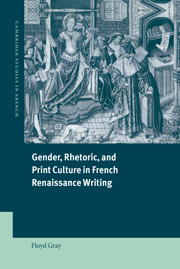Chapter 4 - The women in Montaigne's life
Published online by Cambridge University Press: 22 September 2009
Summary
While early modern poetic language, from Marot to D'Aubigné, is frequently subjective, it is not always clear in what degree it is autobiographical, designed to translate personal rather than universal experiences. The same can be said of prose writers such as Rabelais or even Montaigne who, in presenting themselves in public, remain spectators of their own performance. Writing, they see themselves writing, and their “I” is partially another, designed to fascinate or exemplify. No longer excluded from scrutiny by professional or paratextual protocol, the self-conscious author is clearly a product of the age of printing, constrained to solicit the benevolence of publisher, patron, and reader alike. However, both as a term and a concept, the moi is not part of the language or psychology of identity in sixteenth-century France. The Renaissance “I” signifies the writer's presence, but without any real sense of equivalency with a distinctly inner reality.
The French word identité derives from the Late Latin identitas, from identidem, “repeatedly,” a word which is probably a contraction of the expression idem et idem: “same and same,” that is, the repetition of essential or generic character in different examples or instances. Identity therefore remains constant in relation to change; it is the solid but impenetrable center located in the periphery of self, the “forme maistresse, qui luicte contre l'institution, et contre la tempeste des passions qui luy sont contraires.”
- Type
- Chapter
- Information
- Publisher: Cambridge University PressPrint publication year: 2000

